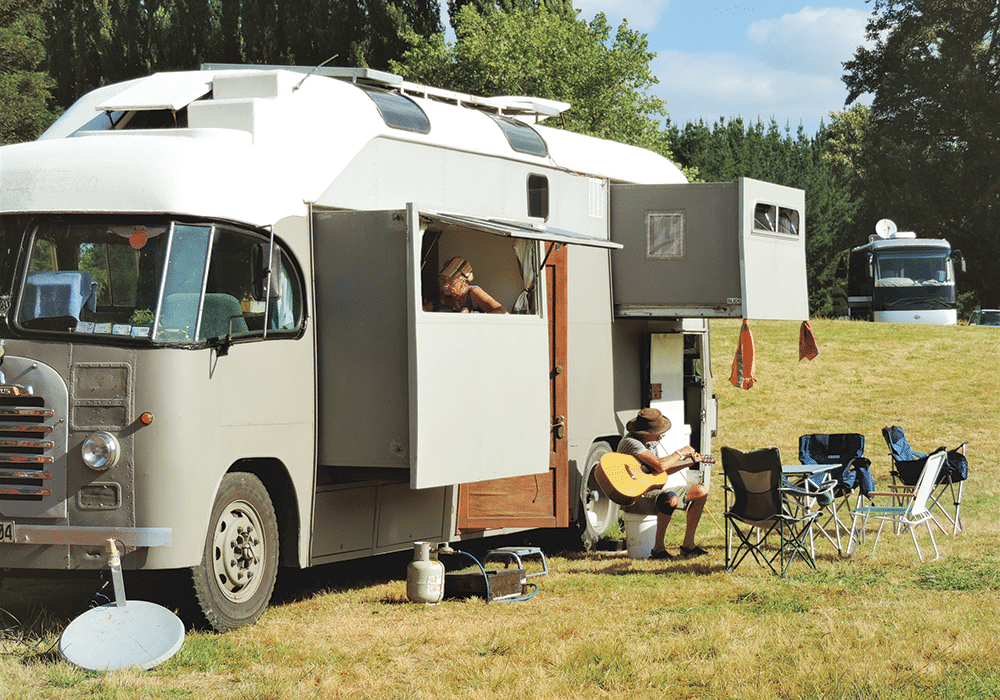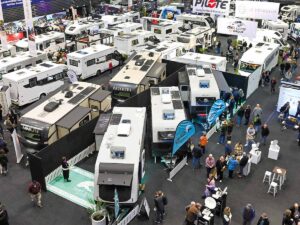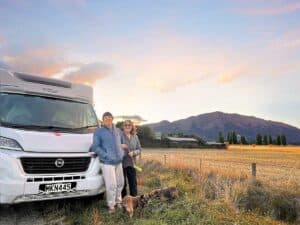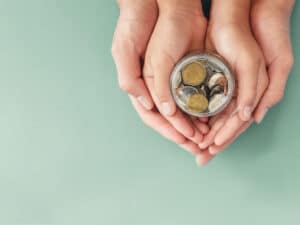For 30 years, Els and Rudy de Man fantasised about living permanently on the road — a dream that they realised 11 years ago. Jill Malcolm caught up with them to learn more.
As with most meetings this year, my meeting with Els and Rudy de Man happened remotely. The couple had spent winter in Waihi, while I was locked down in Auckland. Interviews can be harder if we don’t meet face to face, but in this case, their enthusiasm for their life on the road in a vintage house bus was easy to see – and really quite infectious too.
All such ventures have a history. Rudy and Els, originally from Holland, came to live in New Zealand in the 1980s. Rudy found work at the Marsden Point Oil Refinery, and for two years the couple lived there in the first bus they owned: a marvellous old 1937 Fordson Thames. Rudy converted it with bits and pieces the couple found in the Marsden Point tip.
Then soon after the first of their four children was born and Els was pregnant with a second, they decided it was time to live in a house. They sold the Fordson and did not buy another bus until their children had flown the nest 25 years later. It was 2003 when they came across a privately-owned, 1965, Bedford SB house bus that they refer to as their ‘diamond in the rough’.
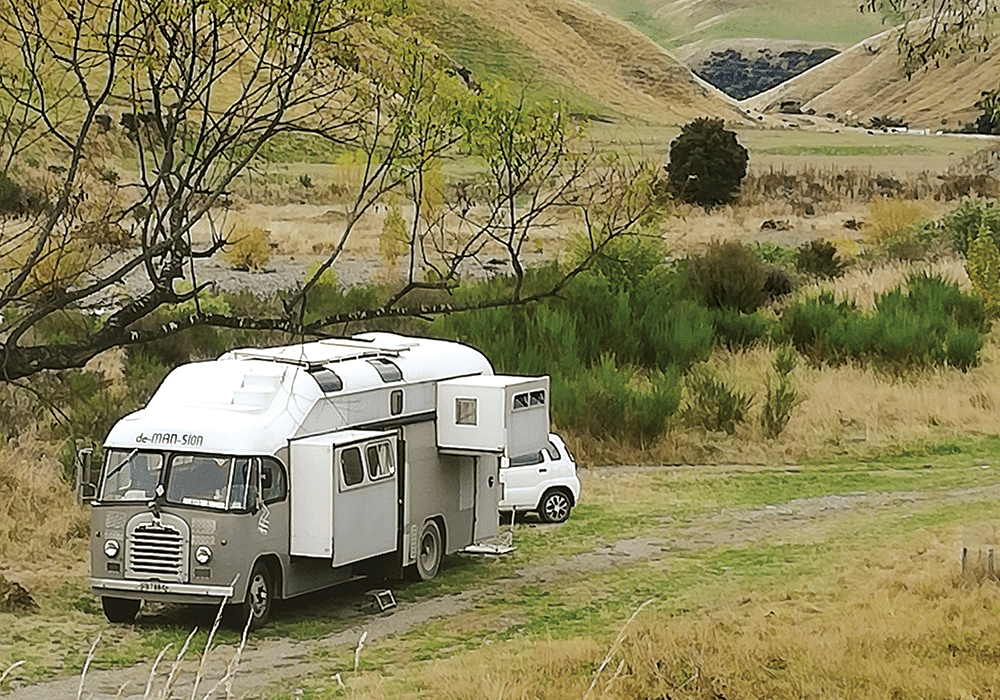
“The bus was three-quarters converted,” said Rudy. The owner had been gradually working on it for the last ten years. “He was a metal worker and an excellent craftsman and had partially fitted out the interior with timber joinery he’d taken from an old house that someone had gifted to him. The furnishings and the beautiful parquet flooring are made from native tawa and rimu. And then after all that work, he’d hooked up with a girlfriend who didn’t like the idea of living in a bus. That’s why he sold it.”
Rudy and Els spent the next seven years completing the job, working on it every night after work. “There was always a problem to be solved,” said Rudy. “We’d find a solution by reading or talking to people and then that particular problem wasn’t a problem any more.”
The de Mans owned a company that built glasshouses, requiring them to travel on occasion. The bus was pragmatic as accommodation when they had to travel for work, even before it was finished.
Part of the pleasure of creating their own interior was using as much recycled material as they could. “We’re Dutch,” Rudy laughed. “We try to get everything for free. But it was more the budget constraints that made this necessary.” said Rudy, “and it was satisfying to be innovative and creative”.
The installations he is most proud of is a large wood-burning stove which he built from steel parts found on the side of the road, an old sink, a gas heater and stainless steel pipes for the chimney which were scraps from a dairy factory. In the large garage are 24 batteries he was given by an alarm installer who didn’t need them. There were other parts of the fit-out to finish off but much of it was aesthetics and fine tuning along with some ingenious practical improvements. One is the pipe system that collects rainwater from the roof of the bus and feeds it into the fresh-water tank. The two extensive slide-outs on the passenger side of the vehicle increase the spaces of the dinette and the bedroom areas but these had been installed by the previous owner.
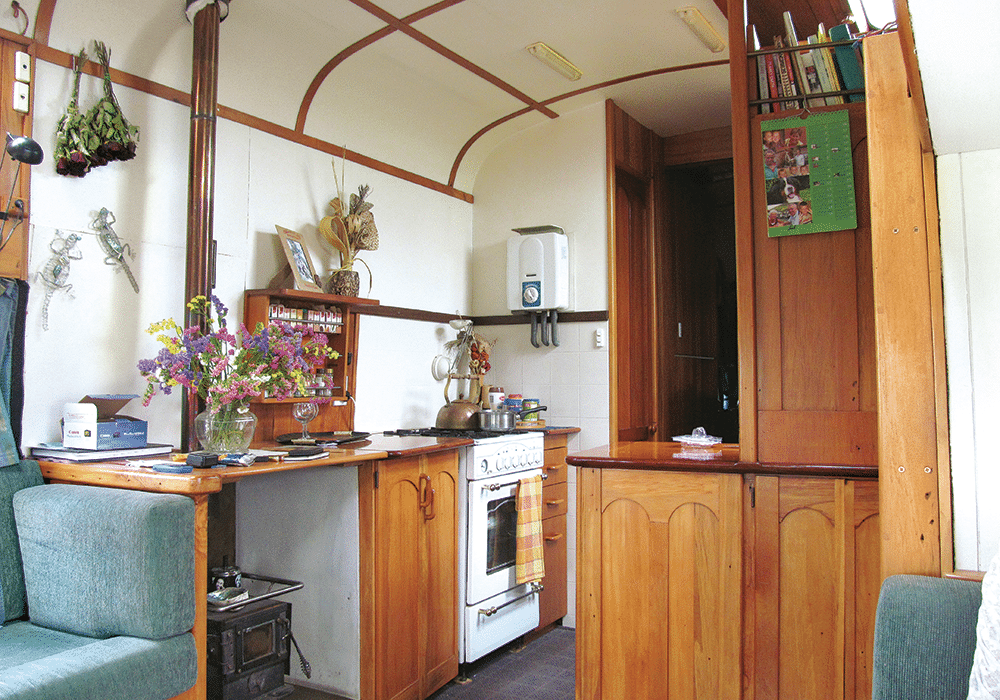
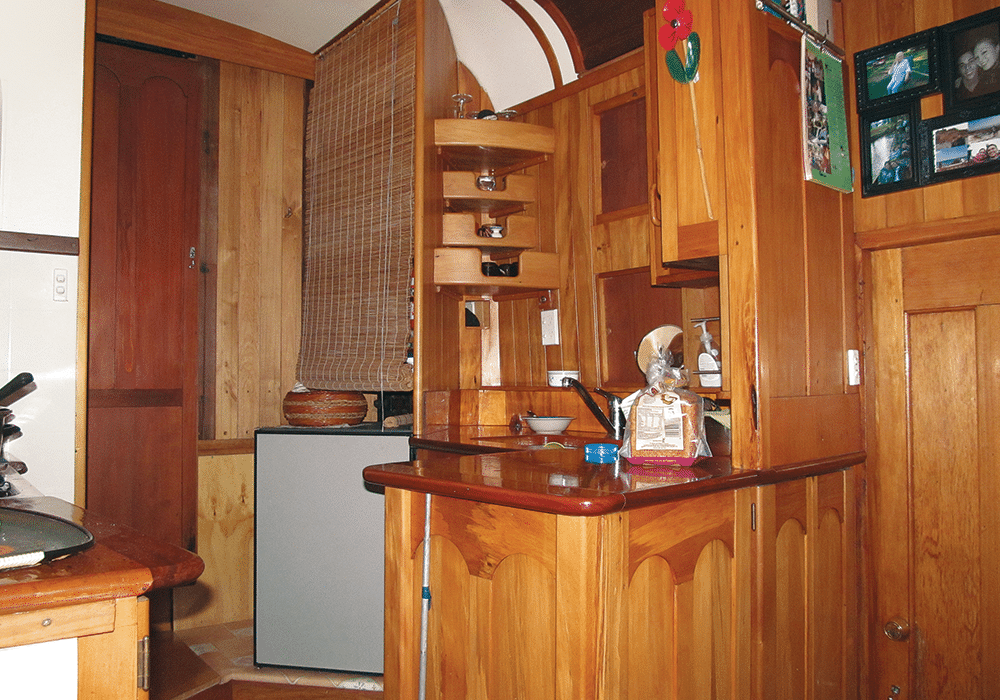
In 2010, when the couple was in their late 50s and their son had taken over the glass house business, they finally hit the road full-time. They dubbed their finished wheel estate ‘de-Man-sion’.
“We never hook up anywhere,” says Rudy. “We’re completely off the grid. The freshwater tank has a 450-litre capacity, the grey water tank takes 250L, and because the toilet is flush, there is a 200L black water tank. Solar panels charge the 24 batteries which means we have 1000 amps of electricity.
We can freedom camp for around three weeks, although this relies on having a bit of rain to fill the water tank.”
“We’ve been on the move for eleven years now,” says Els.
“It feels like a permanent holiday, although occasionally we will go somewhere and do a bit of work to help our son to build a greenhouse. In an RV, choices can be made day by day. If the weather is better somewhere else, if we don’t like the people or because we feel like it, we can move elsewhere. New Zealand must be the best place in the world to do this. We take a Suzuki Swift motor car with us. This is not towed because we never travel far in a day. It means that I drive the car and Rudy drives the bus.”
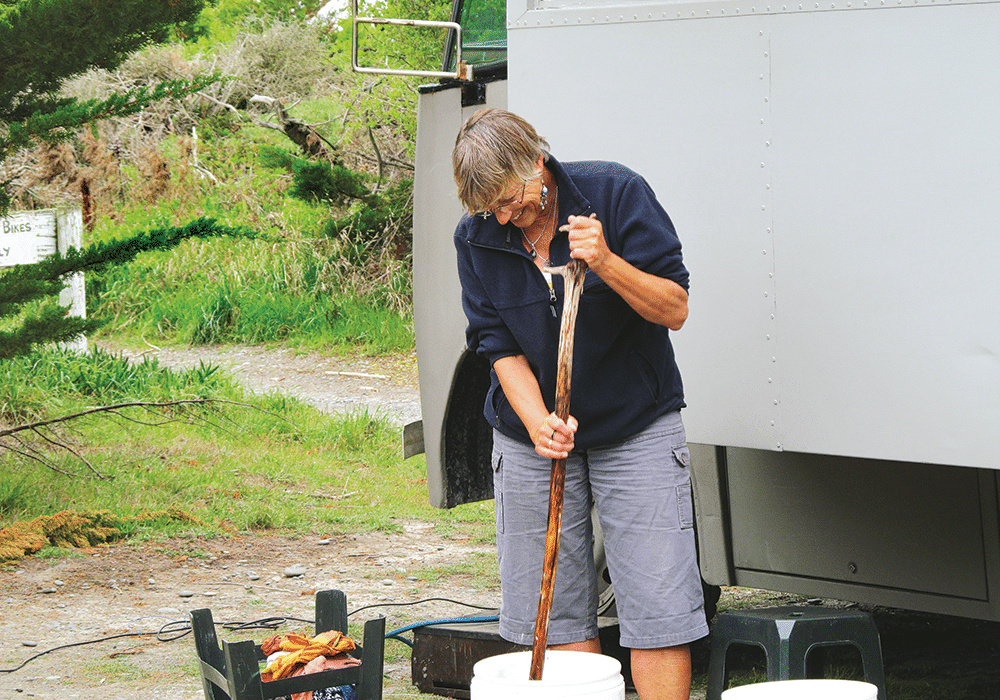
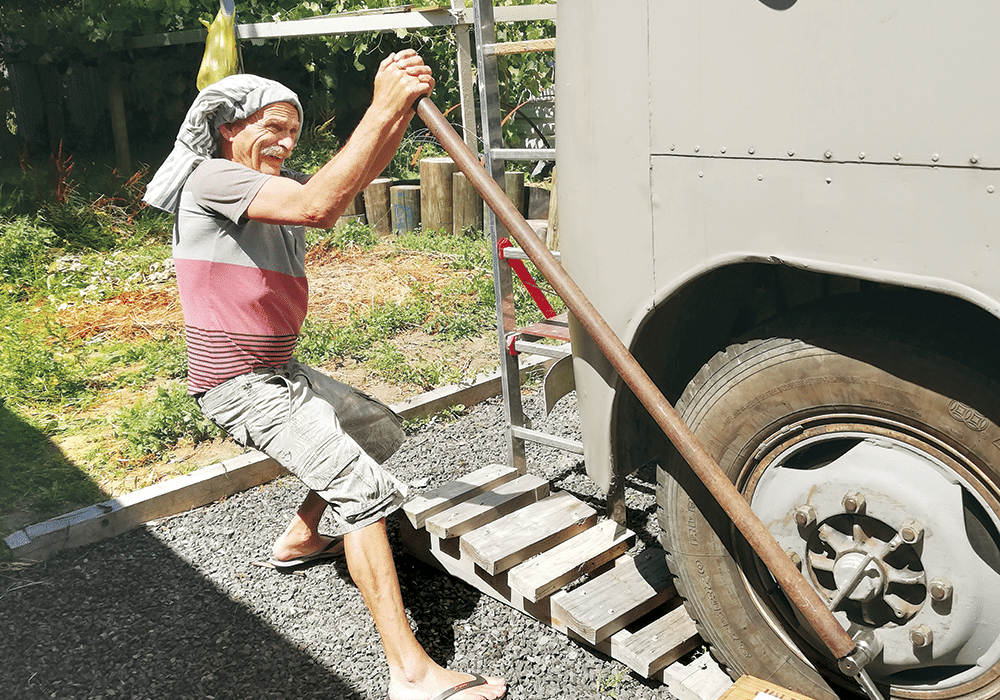
Their lives are varied and interesting but as with anyone’s lives, it’s occasionally not much fun. In a 55-year-old bus, anything can happen. Like the time when they were driving down a hill near Te Kuiti and the rim of the left front tyre split in two.
“I felt this terrific bang,” said Rudy, “and the front of the bus dropped down onto the road. But one of the things we’ve found is that people are incredibly helpful when disasters strike. This time some guys in a four-wheel-drive stopped. ‘You need some help mate?’ one of them asked. ‘Only if you have a really big jack,’ I joked; ‘It’s a ten-ton rig.’ “Well, they opened their boot and there was a house-moving jack. How incredible is that? It was exactly what we needed. We jacked up the front of the bus, got the wheel off and used blocks of wood to support it while I drove off in the Suzuki to find another wheel.”
Another time when the bus clutch gave out on ‘Gentle Annie’ (the backblocks road between Taihape and Napier) they had to drive to Napier in second gear to try and get it fixed. But in a bus of that age, spare parts are not readily available. The bus had to be left there while they drove the Suzuki to Puriri, near Thames, to source a replacement. Then there was the day they were travelling towards Wairoa and became suddenly and dramatically stranded when the manual fuel pump in the bus gave up the ghost.
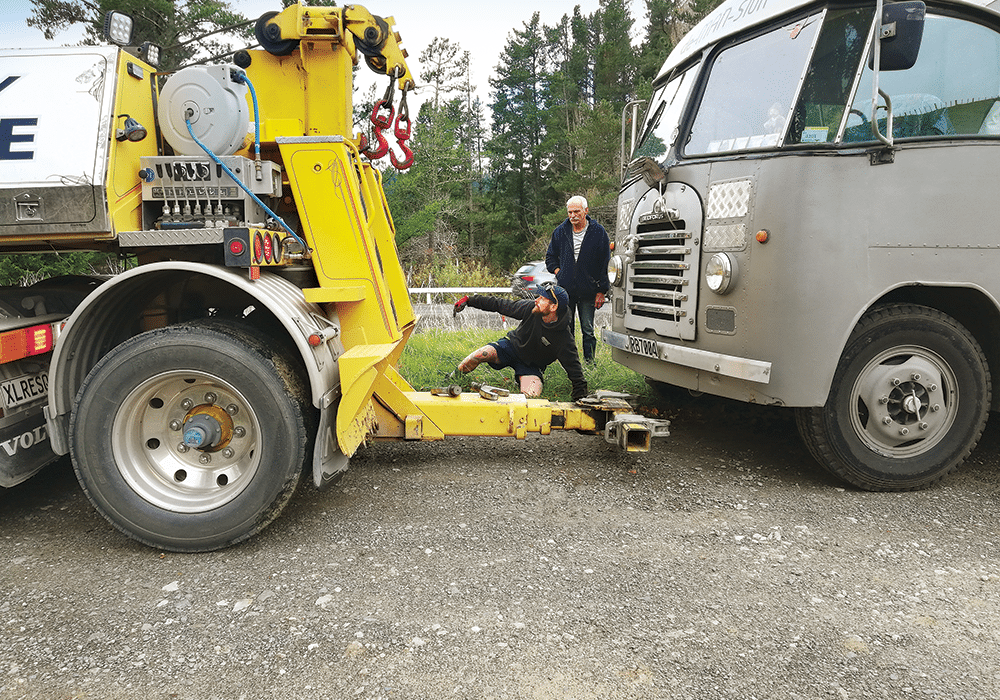
“The old girl stopped on a very dangerous bit of road,” said Rudy. “A local tow company got us to a safer spot where we stayed put until a heavy-towage truck came and took us to Gisborne. We now have an electric fuel pump!”
Like many people who love travelling, they are never short of a story – even if it’s just the type you only laugh about later, once it’s behind you! “One thing for sure we’re never bored,” said Els.
Rudy and Els say they meet such great people along the way and love staying in small towns and villages where they join in with the locals as much as they can, and share their stories. They’ll keep doing this as long as their health holds up but as a bit of future-proofing they have a small plot of land near Hamilton and from time to time go there to work on building a small house should they ever need it.
At the moment that doesn’t look likely.
Looking for motorhomes or caravans for sale in NZ? Browse our latest listings here.

